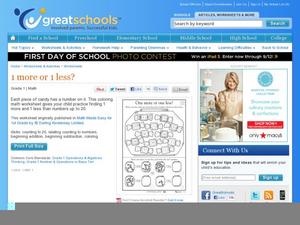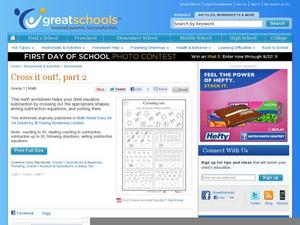Curated OER
One More or One Less?
Hook new mathematicians with a candy-themed approach to addition and subtraction. They examine 10 numbers (not exceeding 19) printed on candy wrappers. For each, learners calculate and record numbers with values one more and one...
Curated OER
Counting: Connecting Pictures and Numbers
As young scholars begin connecting numbers with values, help them grasp this concept with sets of objects like these. They examine five sets (up to 15 in number) and match each to a corresponding digit. Then, they draw a set of their own...
Curated OER
Number Value Assessment
Quiz your second graders with this set of math worksheets involving place value, word problems, number sequence, greater than/less than, coin value, expanded form, and much more! Most have multiple choice answers provided, and generally...
Curated OER
Finding 10s
For beginners to addition, sets of objects are the ideal way to make this concept understandable. For each of these sets they ring 10 and count the remaining. Then, scholars fill in the addends as 10 and the remaining number. The sums...
Curated OER
More Than or Less Than?
How many apples is less than five? Each of these problems has two images, one with quantifiable details and one without (i.e. a tree with apples and an empty tree). Answers will vary as young counters draw objects onto the second image...
Curated OER
Subtracting
Help kids visualize subtraction by assigning these sets of objects for them to subtract. They examine an example before completing the seven equations on their own. For each, learners cross out the subtrahend value and count the...
Curated OER
Reading Numbers
Teach number value to 20 through sets of objects. Young pupils use the number given for each of the four sets to determine how many should be colored in. How many are left? There is an addition box that has been left blank so scholars...
Curated OER
Sets Of
Represent multiplication as sets of items for beginners to this concept. They look at six familiar object sets and determine the total number of legs by counting the sets. There is some scaffolding here, as the first is done for them and...
DK Publishing
Addition: Count and Color, part 2
Introduce young counters to addition through coloring as they examine number sentences represented by sets of objects. Learners count the two addends and color in the sum by counting out the total in a final set. There is an example, and...
DK Publishing
Addition: Count and Color, part 3
Approach addition with sets of objects to show scholars the operation visually. There are four sets of images here arranged as addends in an addition number sentence. Learners count them and color in the total in a final set. All answers...
Curated OER
Study Buddies: Counting Back Tens and Ones
In this math worksheet, students will work with a coach to solve a problem in which they must subtract by counting back by tens and ones. Students will follow a step-by-step process and notes are provided for the coach.
Curated OER
Crossing Out
By crossing out objects young mathematicians can begin comprehending subtraction concepts. They examine six sets, each including two types of shapes. Learners choose one shape to cross out, filling in the subtraction equation this way...
Curated OER
Multiplication as Repeated Addition
For beginners, present multiplication as repeated addition to give them a familiar context. They examine grouped sets of objects and add up the groups to get a total. Then, learners translate the addition sets to a basic multiplication...
Curated OER
Most and Least
Which one has the most? Each row has three sets of identical objects, and scholars compare the sets to determine which has the most or the least (they find the most for the first four and the least for the last four). One example is...
Curated OER
Count by Grouping Into Tens
In this counting by grouping activity, learners group shapes into tens by circling either groups of 5 or ten in ech. A reference website for additional resources is given.
DK Publishing
Number Sentences Multiplying by 3
How many sets of eggs? Approach multiplication through sets of, in this case, three objects. Learners fill in blanks to complete a number sentence in two forms: ___ sets of 3= ___ and ___ x ___ = ___. There is an example they can...
Curated OER
Grade 1 Math Test
In this grade 1 math test worksheet, 1st graders complete a 30 question multiple choice quiz covering a variety of grade 1 concepts.
Curriculum Corner
Second Grade Summer Math Practice Book
Stop the summer lag with a set of second grade Common Core based math practice sheets. Learners fill in hundreds charts with missing numbers up to 1,000. They practice writing numbers in standard, expanded, and word form. Children also...
Curated OER
WS 1.9-Review Calculations
In this calculations worksheet, students find significant figures in numbers, they determine densities of substances and objects, they convert from one metric unit to another and they determine the appropriate unit of measurement for...
Curated OER
WS 1.9 Review-Calculations
In this calculations review worksheet, students convert from one metric unit to another, they identify significant figures in numbers, they find density of substances, and they solve problems using dimensional analysis.
Curated OER
Use Estimation to Compare Numbers
"Take a walk" with this instructional activity and estimate how many birds, ants, turtles, flowers and children getting on a bus that you see. Based on the size of a single set of 10 objects, learners estimate how many are in the whole...
Curated OER
Counting by Grouping Into Tens
In this counting worksheet, students group sets of objects by grouping them into sets of ten, circling as they count. Page 3 is a "teacher guide."
Curated OER
English as an Additional Language: Topic Book 13 The Family 1
In this ESL family worksheet, students respond to 30 matching questions, 50 short answer questions, and 27 drawing questions pertaining to colors, directions, counting, and identifying common objects.
Curated OER
Parts of a Set
Calling all fraction novices! Use sets of objects to introduce scholars to fractions before they even have learned about numerators and denominators (but this is a great way to introduce these terms!). The first section has four...























